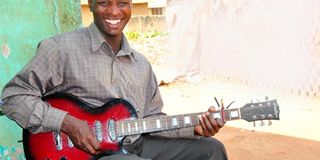Rising above odds to play the guitar

Visually impaired Kennedy Muwanguzi found magic in his fingers
What you need to know:
Kennedy Muwanguzi has visual impairment and strums his guitar with finesse. He told Joseph Kato how he plies his trade in the Kadongo Kamu world.
After enduring the scorching sun from Ndeeba to Kabowa, I arrived at Kidomoole stage at 2.30pm which is about 10 metres away from Kenneth Muwanguzi’s home. On inquiring about him, I realise almost everyone knows him. They quickly show me a corridor that leads to his house.
Clad in a checkered shirt, black trousers and sandals, Muwanguzi sits on the veranda strumming his guitar. Sounding jolly, he offers me a bench near him and we chat about his musical career.
Childhood and interest
Born 30 years ago to Francis Lukonge, Muwanguzi is the last born in a family of 11 children. His mother passed away when he was young. Growing up was tough in Kilaga village, Masaka District.
“I did not go to school because I was always referred to as a useless person. I faced all sorts of mistreatment including going for days without food,” he recalls. He suffered a bout of measles which claimed his sight when he was three months old. “In a bid to help regain my vision, my mother said she visited several clinics including traditional healers but my problem could not be corrected.”
Muwanguzi used to listen to Herman Basudde’s music on radio and they had a collection of cassette tapes of the same musician. This triggered his deep-seated love for music. He was determined to learn how to play a guitar first. In 2003, he met Deo Kaweesi, a friend from the neighbourhood.
“Kaweesi used to play the guitar with finesse and I asked him to teach me the art. It took me three months to master the skill,” he explains. Before they could start classes, he got a menial job offer from a neighbour to collect aggregates to use in the construction of his house floor. This earned him Shs30,000 which he used to buy his first guitar and he embarked on lessons.
First gig
A year later, Muwanguzi came to Kampala under the guardianship of Pastor Dickson Lubowa whose church was at Nakivubo Blue Primary School. “Pastor Lubowa asked me to play the guitar in church in return for rent and food. Sometimes, he would give me pocketmoney,” he explains.
Muwanguzi parted ways with Pastor Lubowa in April 2007 and took to singing on streets to earn a living, to support his then seven-year-old child.
Recording his music
He recorded his first song Atamuzadde in 2011 after he won a music competition that was organised by Beat FM in Kampala. “We were more than 500 upcoming artistes and I managed to top the list because of my good vocals. I was given chance to record a song at Kann Studio owned by singer Mesach Semakula,” he says.
The song is inspired by woes of children who are mistreated by step parents or guardians. Currently, he has more than 12 recorded songs and three music videos. “I get the money to record songs through singing on streets. Sometimes, I’m supported by musicians such as Mesach Semakula of Golden Production and Shan Kwezi, also a Kadongo Kamu artiste,” he explains. His current song is Bakyala baleero, a duet he has done with Kwezi. In the song, he pleads with women while his colleague accuses women of being untrustworthy.
Muwanguzi says through music, he can sustain himself and his three children. “I am happy because I’m not a beggar like most of the visually impaired people. I work hard,” he says.
Challenges
Event organisers, he says, don’t stick to their agreements. “After performing, some organisers tell me that the turn up was low and end up giving me only transport back home,” he says. Also, lack of funds to shoot his music videos and people undermining his ability as an artiste because of his impairment is demoralising to him.
Teaching the skill
Francis Kibuuka, the head teacher of Salaama School for the Blind in Mukono District, says to train someone visually impaired to play a musical instrument is not difficult as long the trainee is interested and committed.
“If someone has interest in a skill, they grasp fast. However, this also depends on one’s ability to understand. Some people are fast , others are slow learners,” he explains.
Kibuuka says when teaching a visually impaired person to play a musical instrument, the trainer starts by teaching them how to hold it firmly, then fingerpicking and how to tune.”
Most people with visual impairment have musical talent but there are no well-established schools and trainers. “Besides, there are no scholastics such as guitars and drums yet many of the people cannot afford them.”
For this, Kibuuka asks the government to set up good schools for people with disabilities. He also calls upon the corporate companies and well-wishers to help such people. “I believe when such people are helped, it could reduce the number of those taking to the streets,” he remarks.




